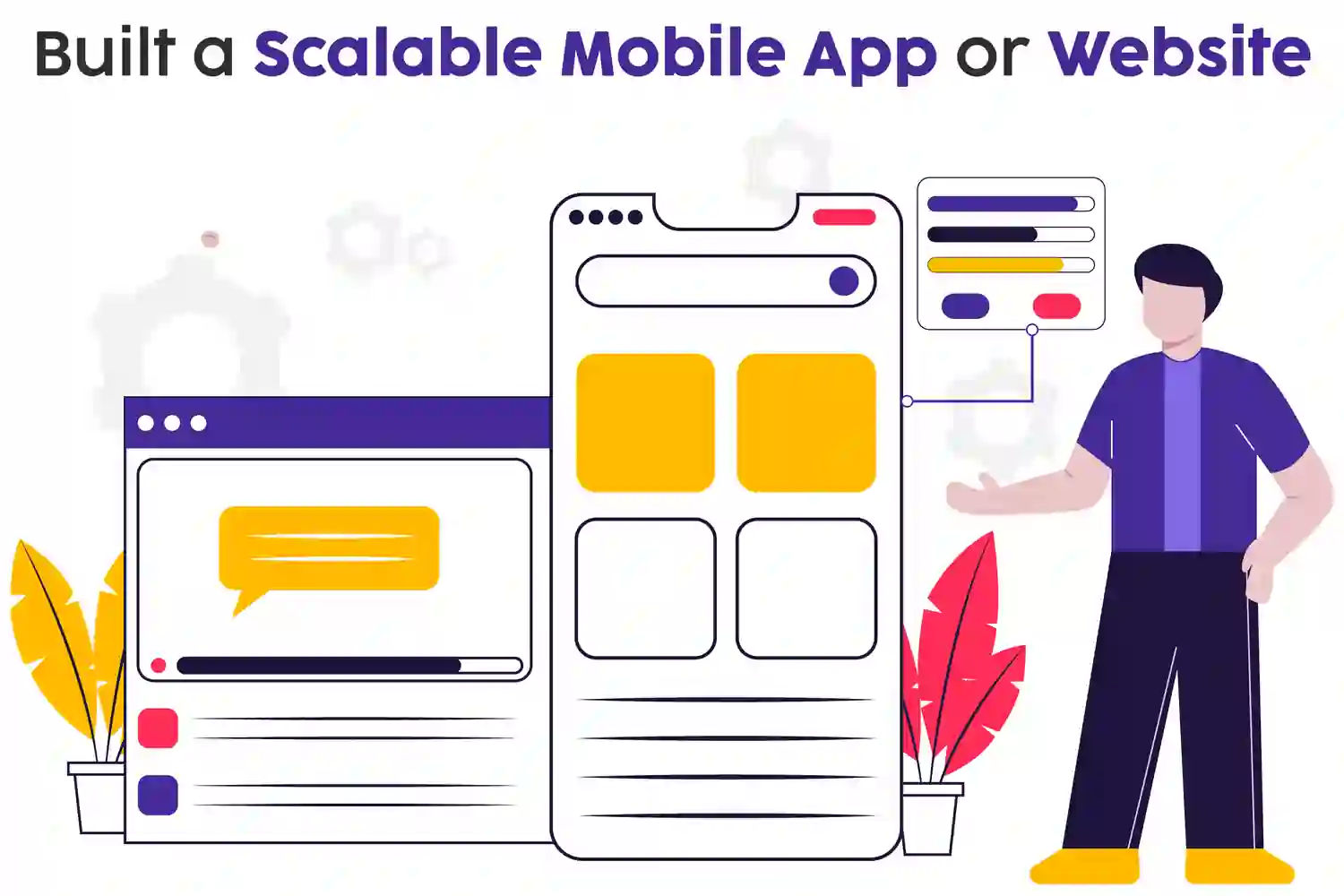
Development of an efficiently growing website or a mobile application is crucial for any business as it anticipates change and works towards the sustainability for growth in the digital era. Scalability checks whether clients’ demands will overwhelm the present capacity of your application or not. Below are the seven specific action plans that you must employ in order to create a product that can expand effectively as well as in tandem with your audience.
If we talk about the Website or Mobile application, then the technology stack is the base of any huge website. Selecting the correct programming language, framework, as well as the tools, will differ greatly depending on your intended scalability of your application.
Frameworks: Opt for a framework that is excellent in terms of scalability. Consider React or Angular for web apps, while Flutter and React Native are good options for mobile apps. These frameworks provide a strong ecosystem and community support.
Databases: Choose a database that can efficiently handle large volumes of data and concurrent user requests. A NoSQL database such as MongoDB or a distributed SQL database such as CockroachDB are good choices for a scalable architecture.
Cloud Services: Leverage cloud platforms such as AWS, Google Cloud, or Microsoft Azure. These services offer scalable solutions that allow you to dynamically adjust resources based on your traffic needs and demands.
Selecting the right technology stack from the start can save you time and resources in the long run. Makes it easy to use website and app development services that support growth...
Microservices architecture is quite useful because it enables you to create your application as a set of dependent services. Each service is related to some particular activity in the context of the given system. This approach enables scalability and flexibility in a way that other approaches do not support. This is because the various services which are in an application are developed, deployed and scaled out separately.
Independent Scaling: You can scale specific services based on user needs without impacting the entire application. For example, if your user authentication service has high traffic, You can scale that service.
Improved Resilience: If one service fails It won't bring the whole system down. Increase overall reliability
Faster Development: Teams can work on different services simultaneously, speeding up the development process.
When planning website or app development services Consider adopting a microservices approach to make updates and scaling easier.
Gradually elevated performance defines the possibilities for scalability. Loading time is a critical factor, which will make any website or mobile application slow and lose customers quicker. Aim at performance with the following:
Content Delivery Network (CDN): Content delivery network (CDN): Use a CDN to distribute your content globally. A CDN stores your website's static content. Reduce loading time and improve user experience Especially for users who access your app from different geographic locations…
Lazy Loading: Use loading when needed for images and other resources. This ensures that only necessary content is loaded when users scroll through your app or website. This technique saves bandwidth and speeds up initial loading.
Code Minification: Minify your CSS, JavaScript, and HTML files to reduce size and improve loading times. Smaller file sizes mean faster downloads and a better user experience.
By optimizing your applications for performance You'll be better able to support increased traffic and improve user satisfaction. Make your website development and app development services more efficient..
Unlock the full potential of your website with expert SEO strategies. Learn more about why SEO is crucial for your online success.
With DIGITTRIX, watch your search rankings soar while you concentrate on scaling your business.
A good scalable website or branded app should ensure that it meets the customer’s expectations. The meaning and implication of a positive UX hence are high engagement in the subsequent use of the respective product or service. This remains a critical consideration as an organization looks to scale its operation.
Responsive design: Make sure your application is responsive and works well across devices such as smartphones, tablets, and desktops. In a multi-device world, at present Smooth experience across devices is considered important
Intuitive Navigation: Design an intuitive navigation system that helps users find what they are looking for quickly and easily. A simple navigation structure eliminates user frustration and increases satisfaction.
Consistent Branding: Maintain consistent branding on your website and apps to build trust and recognition. A consistent design creates a sense of familiarity for users. and encourage them to come back for more.
With a focus on user experience, You can create products that are not only technically scalable. But it also resonates with your users. This will increase the efficiency of your app and website development services.
Ongoing monitoring of processes and their analysis allows for the definition of critical work areas and problem spots. Make use of the performance monitoring tool to understand the way users engage with your website or mobile application.
Google Analytics: Use Google Analytics to track user behavior, conversion rates, and other key metrics. This tool provides valuable insights into which features users engage with and where they leave.
Application performance monitoring (APM): Tools like New Relic or AppDynamics can help monitor your application performance in real-time. By identifying problems before they affect users, APM tools can identify slow database queries or server response times.
By analyzing performance data on a regular basis, we analyze performance data on a regular basis. You can make informed decisions about scaling and optimizing your application. Ensure that your website and application development services are always in line with your users' needs.
Unlock your business's full potential! Discover Digittrix's insights on custom web development and take your business to the next level.
Practitioners of agile development stress flexibility and the ability to respond to changes. This is an important factor when designing an exponential website or a downloadable mobile app. That way, by using Agile approaches you will be able to carry on improving the product in cycles. It also contributes to quick release and improvement.
Continuous Feedback: Collect feedback from users regularly to inform your development process. To ensure that as your application evolves It will meet your needs. A user-centric approach keeps your product relevant.
Frequent releases: Use short development cycles to release features and improvements more often. Rapid iteration allows you to quickly respond to user feedback and tailor it to market needs.
Adaptability: Adaptability: Agile methods allow your team to adapt to changing market conditions. User preferences or technology trends This adaptability is critical in a rapidly changing digital environment.
By combining Agile practices with web development services and app development services, you can create more adaptable and scalable products that continuously evolve with your audience's needs. Agile methodologies promote regular feedback loops, which allow you to make iterative improvements, ensuring that your website or app keeps pace with changing user demands and market trends.
Leveraging resources for scalability extends beyond just adopting the right technologies—it involves comprehensive planning for future growth across various facets of your business. While technological solutions are vital, leveraging the right people, processes, and strategies ensures that you can maintain growth without disruption. To prepare your website or mobile app for scaling Consider the following strategies:
Load Balancing: Use a load balancer to evenly distribute traffic across your servers. This ensures that no server becomes a bottleneck. This increases efficiency during peak traffic spikes.
Database sharing: Divide your database into smaller, more manageable chunks (shards). To improve performance and scalability Sharing helps spread the workload and improves browsing performance.
Automated Testing: Develop a robust automated testing framework to ensure new features and updates do not impact performance or user experience. Regular testing helps maintain quality as you scale.
By planning for scaling from the beginning, you can avoid potential problems that may arise as your website or mobile app grows. Proactively addressing scalability ensures that your application can handle increased traffic, data loads, and user demands without compromising performance or user experience. This foresight not only minimizes the risk of costly downtime or crashes but also improves the overall stability and reliability of your platform.
Designing for a website or mobile application involves a lot of considerations of having a large user base at a later stage. This applies to technology options, and architecture optimization. Online customers’ experience, audibility, agile methodology, and preparations for subsequent development paradigms. These things... This means that when You’ve applied the seven strategies You can be sure that your application will be able to adapt to the audience demand and complexity to meet the evolving needs of your audience.
Creating a scalable website or mobile app is essential for businesses looking to grow in today’s dynamic digital landscape. At Digittrix, we specialize in developing robust, scalable solutions that can adapt to your changing needs as your business expands. Our expert developers leverage the latest technologies to ensure your web or mobile application can handle increased traffic and functionality seamlessly.
From optimizing performance to implementing efficient database management and cloud solutions, our team guides you through every step of the development process. With 14 years of experience, Digittrix empowers your business to stay competitive by building scalable applications tailored to your specific requirements.
If you’re ready to start building your scalable app but don’t know where to begin, schedule your appointment or book a consultation with our expert technical managers today by calling +91 8727000867 or writing to us at digittrix@gmail.com for all your inquiries.


Written by Vandana Abrol
An enthusiastic developer and skilled business management expert with over a decade of experience in the field
Do you need help in Web Development ?




Join over 1500+ businesses we've already helped!
Scalability refers to the ability of a website or mobile app to handle increased traffic, users, and data without sacrificing performance or functionality. A scalable application can grow and adapt to changing demands with minimal disruption.
Scalability ensures that your website or mobile app can handle future growth and increased demand. Without scalability, your application may slow down, crash, or deliver poor user experiences as traffic and data increase, potentially driving users away.
A microservices architecture divides an application into smaller, independent services. Each service can be developed, deployed, and scaled separately, making it easier to manage increased demand and improve overall resilience. This approach supports agile and flexible scaling.
A good user experience (UX) helps retain users and ensures your app or website can grow without losing users due to poor navigation, slow performance, or bad design. Focusing on responsive design, intuitive navigation, and consistent branding is essential for scalable apps and websites.

©2026Digittrix Infotech Private Limited , All rights reserved.